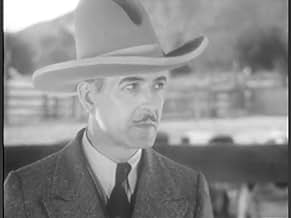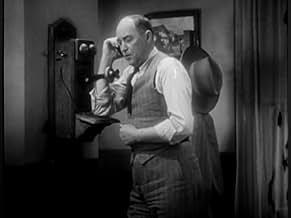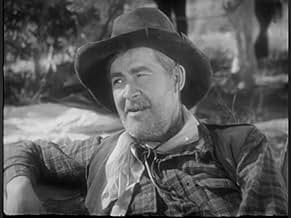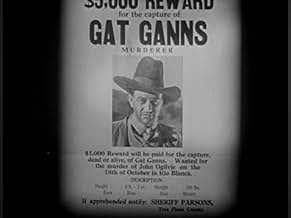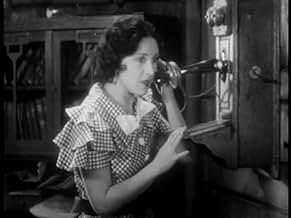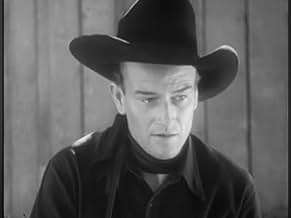Ajouter une intrigue dans votre langueTed Hayden impersonates a wanted man and joins Gentry's gang only to learn later that Gentry was the one who killed his father. He saves Virginia Winters' dad's ranch from Gentry and also re... Tout lireTed Hayden impersonates a wanted man and joins Gentry's gang only to learn later that Gentry was the one who killed his father. He saves Virginia Winters' dad's ranch from Gentry and also rescues his long-lost brother Spud.Ted Hayden impersonates a wanted man and joins Gentry's gang only to learn later that Gentry was the one who killed his father. He saves Virginia Winters' dad's ranch from Gentry and also rescues his long-lost brother Spud.
- Réalisation
- Scénario
- Casting principal
- Fay Winters
- (as Virginia Faire Brown)
- Dusty Rhodes
- (as George Hayes)
- Mr. Gentry
- (as Loyd Whitlock)
- Spud Hayden
- (as Billie O'Brien)
- Cattle Buyer Hornsby
- (non crédité)
- Doctor Silsby
- (non crédité)
- Henchman
- (non crédité)
- Henchman
- (non crédité)
- Henchman
- (non crédité)
- Henchman
- (non crédité)
- Henchman Butch
- (non crédité)
Avis à la une
Young John Wayne and grizzled George Hayes start with what I learned in college theater-history classes was called a "feather-duster" scene, where characters -- such as a maid, with a feather-duster -- tell the background of the story, today called "the back story."
It's kinda corny, but isn't too damaging.
Probably even in 1934 what was about to happen was predictable, but, before that predictable ending, enough happens in between it should hold the viewer's interest. It held mine.
When the hero meets the leading lady, there is no poor-writing instant romance. In fact, there is no real contact. It's an unusual boy-meets-girl.
That girl is Virginia Faire Brown, who is shown with 74 credits, although she never rose to be a major player and certainly not a star. But she is very attractive, even elegant, with an unusual dark-haired beauty.
Her character's father is played by the veteran Lafe McKee. The sheriff is by that veteran, and very talented actor, who didn't, alas, often enough get to show just how good an actor he was, Earl Dwire.
Chief bad guy is played by "Loyd Whitlock," who is usually known as Lloyd Whitlock, a very busy man with more than 200 credits!
OK, good story, great cast ably performing, lots of riding scenes, and a no-music-track realism that should keep you pinned to your seat. And if you want to see it, there's a good print at YouTube.
This is a fairly acceptable entry in John Wayne's Lone Star series of films made in the early to mid-thirties. There is quite a diverting storyline, even though the acting is as creaky as usual for these flicks. It's the stunts that stand out in all of the low budget efforts Wayne made in those days, and their success is thanks to stuntman extraordinaire Yakima Canutt. You get the impression as you watch that some real hair-raising risks were taken to capture these scenes and you sometimes wonder whether it was worth it considering the poor quality of most other aspects of the films. Watch out for Canutt standing in for bad guy Lloyd Whitlock, who sports a full head of greying hair, in the fight with Wayne near the end of the film. Canutt had dark hair and a noticeable bald patch, but hack director R. N. Bradbury obviously didn't believe in going to the expense of making even a perfunctory effort to disguise the actors' physical differences. Oddly enough, it's this kind of lack of attention to detail that make the Lone Star films so curiously endearing.
Rather than having a five-minute prologue to the situation involving the central character as a 12-year-old boy, production values save time and cost by opening the story revolving the now adult Ted Hayden (John Wayne) accompanied by his friend, "Dusty" Rhodes (George "Gabby" Hayes, minus his beard that would later make him famous) resting out in the wilderness discussing the murder of Hayden's father when he was a boy. Left for dead, Ted is said to be found and taken in by Dusty, who, after two years under his care, has brought him back to heath. Ted also has a little brother whose mother died at the time of his birth, and wants to find him. During this reminiscing of the past leading to both men returning to the scene of the crime, Ted and Dusty notice a man stumbling to the ground, dying after drinking poisoned water. Finding an envelope on his person, they find the deceased to be Gat Ganns, a wanted killer with a $5,000 reward for his capture. Convinced of Ganns association with Jeffrey Gentry (Lloyd Whitlock), the man who bought his father's ranch, to be responsible for his father's death and brother's abduction, Ted, who bears a close resemblance to the deceased, poses Ganns to work under Gentry to see if his hunch is correct. In the meantime, Gentry, losing his bid to buy the ranch belonging to Fred Winters (Lafe McKee) and his daughter, Fay (Virginia Browne-Faire), schemes to get that ranch regardless. He has two of his henchmen to follow and rob Fay of the $3,000 for bank deposit to ruin for father financially. Accidentally shot while hiding in an abandoned barn, Fay is later found unconscious by Ted, who takes her to Doctor Silsby (Philip Kieffer) for treatment. Having found her money, Ted deposits it for her in secret at the bank. Now working for Gentry to do away with Winters, Ted later saves Spud (Billy O'Brien), a 12-year-old boy from a runaway coach and from the brutal whipping by his brutal father, Butch (Blackie Whitford. The closer Ted gets to his father's murder, the more his life is in danger. Other supporting players include Yakima Canutt, Earl Dwire and Horace B. Carpenter.
As with many of Wayne's early westerns, he bonds well with his co-stars, Virginia Browne-Faire, and youngster, played by Billy (billed Billie) O'Brien, another good reason the film works so well. Even with lack of production values, it still has charm. Chances are the plot summary had been used earlier or later with other western actors, but it's John Wayne, better known as "The Duke," who's the reason this and other his early westerns have remained watchable long after its theatrical releases.
Distributed on video cassette in the 1980s, the decade where this and other of Wayne's Lone Star westerns frequently played for a while on public television, WEST OF THE DIVIDE, also available on DVD, has had its cable television presentations, namely American Movie Classics (1996-2000) and Encore Westerns. Beware of prints with new and poorly constructed underscoring used during opening and closing credits, along with scoreless scenes that would be rough sledding for viewers to stop watching long before the movie comes to a close. (**1/2)
And then there is the young John Wayne. I think it is during this period in his career that he proved himself to be the giant star he became. When he dons white buckskin in "The Telegraph Trail," he becomes almost otherworldly. Here he plays a man posing as an outlaw to find the killer of his father. By the time he has set things right, lying supine in his long-lost brother's arms, you understand why so many moviegoers couldn't get enough of him. His entire body in that moment gives way to the scene, and you cherish how tenderly and passionately he's willing to play his part. This movie taps into that well of memories some of us have with family and loved ones, and as Father's Day is tomorrow, it helps remind me what deep, elemental emotion men often feel that these days goes unacknowledged. I certainly wasn't aware of it in those days with my grandfather; but I've gained a new consciousness that has come with my being about his age at the time and watching things I know he'd have loved. Like "The West Divide." It makes you wish they made more westerns like this one.
Le saviez-vous
- AnecdotesIn 1934, this film was condemned by the Catholic Legion of Decency.
- GaffesDuring a fight between Ted Hayden and Butch, Spuds shouts, "Come on, Ted!" Actually, Ted has been introduced to him and all others at the gangsters' hide-out as Gat Ganns. His real identity is in fact revealed later.
- Citations
Doctor Silsby: You got her here just in time. A small artery's been severed. However, I don't think it's very serious.
- Versions alternativesFox/Lorber Associates, Inc. and Classics Associates, Inc. copyrighted a version in 1985 with a new original score composed and orchestrated by William Barber. It was distributed by Fox/Lorber and ran 48 minutes.
- ConnexionsEdited into Six Gun Theater: West of the Divide (2016)
Meilleurs choix
- How long is West of the Divide?Alimenté par Alexa
Détails
- Durée
- 54min
- Couleur
- Mixage
- Rapport de forme
- 1.37 : 1

